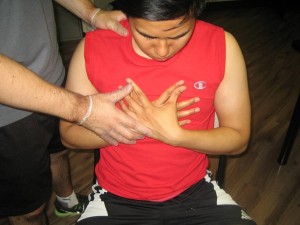There are various causes of chest injuries. An individual who sustained a direct strike to the chest might end up with a trivial or significant injury. It is not uncommon to experience shortness of breath for a brief time after a bash to the chest.
Even after sustaining chest injuries, it is vital to determine if the pain might be triggered by a heart issue. If the individual does not have any indications of angina or a heart attack, the pain is likely due to the chest injury.
Minor chest injuries
For minor chest injuries, there is chest wall pain that can arise with movement of the shoulder, arm, rib cage or trunk of the body.
Remember that even a minor injury can result to chest pain that can last for days after the injury. Coughing, deep breathing or sneezing can aggravate the pain as well as pressing down or lying on the affected area.

Most cases of minor chest injuries do not require a trip to a doctor. Treatment at home can alleviate the pain and discomfort.
Serious injuries to the chest
Pain or difficulty breathing that immediately starts after an injury might indicate that the organs within the chest such as the heart, lungs or blood vessels are damaged. The other symptoms often develop rapidly such as severe shortness of breath or indications of shock. A strong strike to the chest can damage the organs in the chest or upper abdomen.
- A blow to the sternum can damage the heart or the large blood vessels or even the esophagus.
- If the chest is struck, the lungs or the trachea can be damaged.
- If the back part of the chest is struck, the kidneys might be affected.
- A strike to the side of the chest or lower region of the chest can impair the spleen or liver.
Close look on a rib fracture
Chest injuries can also break a rib or damage the cartilage of the rib cage. The indications of a bruised or fractured rib include:
- Piercing, intense pain in the site of injury
- Pain that is aggravated while coughing or breathing
- Pain that worsens if pressing or lying on the affected area.
It is important to note that rib fractures can be painful but often treated at home if there are no symptoms.
Disclaimer / More Information
The information posted on this page on chest injuries is for learning and educational purposes only. To learn to manage injuries to the chest area, register for first aid training at one of our training centers located throughout Canada. The training centers are in Edmonton, Calgary, Vancouver, Kelowna, Surrey, Winnipeg, Toronto, Ottawa and Halifax.
